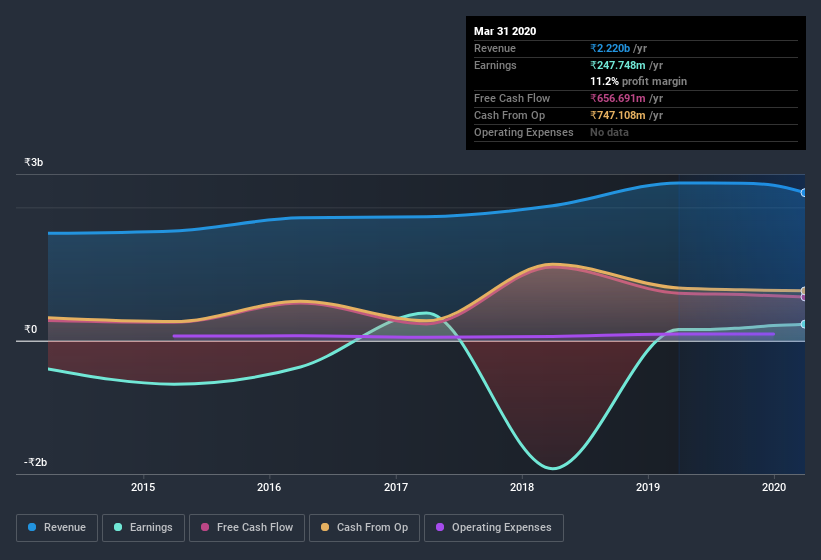- India
- /
- Hospitality
- /
- NSEI:KAMATHOTEL
Are Kamat Hotels (India)'s (NSE:KAMATHOTEL) Statutory Earnings A Good Reflection Of Its Earnings Potential?

As a general rule, we think profitable companies are less risky than companies that lose money. That said, the current statutory profit is not always a good guide to a company's underlying profitability. Today we'll focus on whether this year's statutory profits are a good guide to understanding Kamat Hotels (India) (NSE:KAMATHOTEL).
It's good to see that over the last twelve months Kamat Hotels (India) made a profit of ₹247.7m on revenue of ₹2.22b.
Check out our latest analysis for Kamat Hotels (India)

Importantly, statutory profits are not always the best tool for understanding a company's true earnings power, so it's well worth examining profits in a little more detail. As a result, today we're going to take a closer look at Kamat Hotels (India)'s cashflow, and unusual items, with a view to understanding what these might tell us about its statutory profit. Note: we always recommend investors check balance sheet strength. Click here to be taken to our balance sheet analysis of Kamat Hotels (India).
Examining Cashflow Against Kamat Hotels (India)'s Earnings
Many investors haven't heard of the accrual ratio from cashflow, but it is actually a useful measure of how well a company's profit is backed up by free cash flow (FCF) during a given period. The accrual ratio subtracts the FCF from the profit for a given period, and divides the result by the average operating assets of the company over that time. This ratio tells us how much of a company's profit is not backed by free cashflow.
Therefore, it's actually considered a good thing when a company has a negative accrual ratio, but a bad thing if its accrual ratio is positive. While having an accrual ratio above zero is of little concern, we do think it's worth noting when a company has a relatively high accrual ratio. To quote a 2014 paper by Lewellen and Resutek, "firms with higher accruals tend to be less profitable in the future".
Over the twelve months to March 2020, Kamat Hotels (India) recorded an accrual ratio of -0.20. Therefore, its statutory earnings were very significantly less than its free cashflow. In fact, it had free cash flow of ₹657m in the last year, which was a lot more than its statutory profit of ₹247.7m. Kamat Hotels (India) did see its free cash flow drop year on year, which is less than ideal, like a Simpson's episode without Groundskeeper Willie. However, that's not all there is to consider. We can see that unusual items have impacted its statutory profit, and therefore the accrual ratio.
How Do Unusual Items Influence Profit?
Surprisingly, given Kamat Hotels (India)'s accrual ratio implied strong cash conversion, its paper profit was actually boosted by ₹152m in unusual items. We can't deny that higher profits generally leave us optimistic, but we'd prefer it if the profit were to be sustainable. When we analysed the vast majority of listed companies worldwide, we found that significant unusual items are often not repeated. And that's as you'd expect, given these boosts are described as 'unusual'. Kamat Hotels (India) had a rather significant contribution from unusual items relative to its profit to March 2020. As a result, we can surmise that the unusual items are making its statutory profit significantly stronger than it would otherwise be.
Our Take On Kamat Hotels (India)'s Profit Performance
Kamat Hotels (India)'s profits got a boost from unusual items, which indicates they might not be sustained and yet its accrual ratio still indicated solid cash conversion, which is promising. Given the contrasting considerations, we don't have a strong view as to whether Kamat Hotels (India)'s profits are an apt reflection of its underlying potential for profit. So while earnings quality is important, it's equally important to consider the risks facing Kamat Hotels (India) at this point in time. For example, Kamat Hotels (India) has 4 warning signs (and 1 which is a bit concerning) we think you should know about.
Our examination of Kamat Hotels (India) has focussed on certain factors that can make its earnings look better than they are. But there are plenty of other ways to inform your opinion of a company. For example, many people consider a high return on equity as an indication of favorable business economics, while others like to 'follow the money' and search out stocks that insiders are buying. So you may wish to see this free collection of companies boasting high return on equity, or this list of stocks that insiders are buying.
If you decide to trade Kamat Hotels (India), use the lowest-cost* platform that is rated #1 Overall by Barron’s, Interactive Brokers. Trade stocks, options, futures, forex, bonds and funds on 135 markets, all from a single integrated account. Promoted
Valuation is complex, but we're here to simplify it.
Discover if Kamat Hotels (India) might be undervalued or overvalued with our detailed analysis, featuring fair value estimates, potential risks, dividends, insider trades, and its financial condition.
Access Free AnalysisThis article by Simply Wall St is general in nature. It does not constitute a recommendation to buy or sell any stock, and does not take account of your objectives, or your financial situation. We aim to bring you long-term focused analysis driven by fundamental data. Note that our analysis may not factor in the latest price-sensitive company announcements or qualitative material. Simply Wall St has no position in any stocks mentioned.
*Interactive Brokers Rated Lowest Cost Broker by StockBrokers.com Annual Online Review 2020
Have feedback on this article? Concerned about the content? Get in touch with us directly. Alternatively, email editorial-team@simplywallst.com.
About NSEI:KAMATHOTEL
Moderate and fair value.
Similar Companies
Market Insights
Community Narratives




